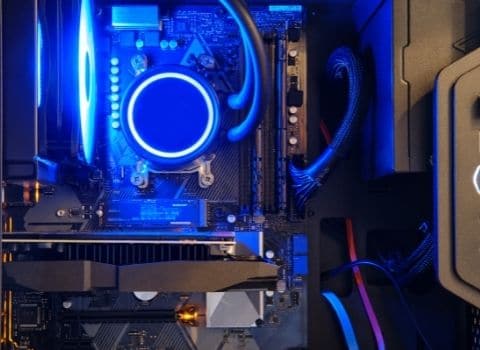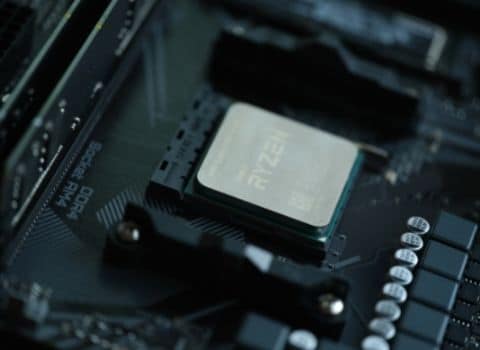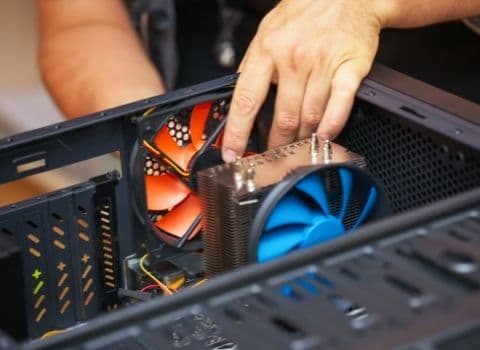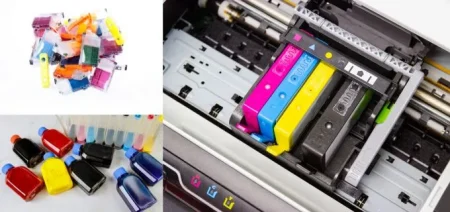
There is a lot of debate over whether or not liquid cooling is worth it. There are a lot of advantages to the use of liquid cooling systems for your personal computer. On the other hand, these systems can be expensive, and some argue that they do not provide enough benefit to justify the cost. In this post, we’ll examine all sides of the debate and help you determine whether a cooling system that uses liquids is the right choice for you.
1. What is liquid cooling?
Liquid cooling is a system that uses water or another coolant to keep your computer’s internal components cool. This contrasts to traditional methods like fans, which use air to keep your computer cool. Liquid cooling systems have been used for years in high-end gaming and workstations computers, but they have become more popular among everyday PC users in recent years.
Is Liquid Cooling Better Than Fan Cooling?
When it comes to is liquid cooling better than fan cooling, the answer is yes. Liquid cooling is a system that uses liquid to cool your computer’s hardware. This is different from the conventional technique of using a fan to blast air across the computer to keep it cool. The main benefit of using a liquid cooling system is keeping your computer cooler than a traditional air-cooling system. This is because water has a greater heat capacity than air, which means it can absorb more heat before it begins feeling warm. Additionally, water is a better conductor of heat than air to disperse heat more effectively.
There are many reasons you should buy a fluid cooling system for your computer. Some of these reasons include improved performance and longer life for your computer.
- Liquid cooling is more efficient than fan cooling.
- This cooling system is less noisy than fan cooling.
- It will not overheat your computer.
- Liquid-cooling is a great way to boost speed and performance on your PC.
- It can prolong the lifespan of the computer.
- This is more efficient in energy use than fan cooling.
- Liquid-cooling is much easier to maintain than fan cooling.
- Liquid cooling is more adaptable than fan cooling.
- Liquid-cooled computers are frequently employed in high-performance gaming and video editing software.
- The design and aesthetics of a cooling computer are usually more appealing than the fan-cooled computer.

Is liquid-cooling your PC safe?
When it comes to PC cooling, there are two main options: Air cooling and Liquid cooling.
- Air cooling is the more common option, and it uses a standard heatsink and fan to keep your PC’s internal components cool.
- Liquid cooling is a newer technology that is quickly gaining in popularity, and it works by using a special liquid circulated through tubing to your PC’s internal components.
So, is liquid-cooling your PC safe? The answer is yes, but there are a few things you need to keep in mind. First of all, you should always follow the instructions for your liquid-cooling system. If you don’t install the system correctly, it could cause damage to your PC.
Second, you need to make sure that you use a suitable liquid. Various liquids can be used for liquid cooling, but not all of them are safe for your PC. Make sure to read the instructions with your system to find out what type of liquid is best.
Finally, you need to be careful when handling the tubing and other components of your liquid-cooling system. If you’re not careful, you could accidentally kink or damage the tubing, which could cause a leak.
Overall, liquid-cooling your PC is safe. As long as you follow the instructions and take the appropriate precautions, is possible. Liquid cooling is an effective way to keep your PC cool
Risks of water cooling PC
Liquid cooling is a great way to keep your computer running smoothly, but some risks are associated with it. One is that if the liquid is not circulated correctly, it can cause the computer to overheat. Another is that if the fluid is not clean, it can damage the computer’s internal components. It would help if you also were careful when adding or removing liquid from the system, as it can be easy to spill.
The benefits of using a liquid cooling system
Liquid cooling is a technology used to cool computer systems by circulating water or other liquids through a block placed on top of the CPU. A radiator then cools the block, usually mounted in the case near the graphics card. By doing this, it allows for better thermal performance as well as overclocking headroom due to lower temperatures. In addition, it can also look incredibly good when done right. There are seven reasons to get a liquid cooling unit for your computer.

1. Better thermal performance
One of the major benefits of liquid cooling is its better thermal performance. This happens because water is a better heat conductor than air. So, circulating water through the block on top of the CPU can take the heat away much more effectively. This is especially important if you want to overclock your CPU, as higher temperatures can lead to instability. When your computer’s components are cooler, they can run faster and with greater stability. This is because overheating can cause components to slow down or become unstable.
2. Incredible Aesthetics
Another reason to get a liquid cooling system is for the aesthetics. When done right, a liquid cooling system can look absolutely incredible. There are many different ways to customize it to make your rig stand out from the rest. You can get different colored tubing, coolant, and even add LEDs to really make it your own.
3. Fewer clearance issues for RAM
Another benefit of liquid cooling is that it can help with clearance issues for RAM. The radiator is usually mounted in the case near the graphics card, which leaves more room for RAM slots. So, if you have a high-end graphics card that is taking up a lot of space, you will still be able to have all of the RAM that you need.
4. The best way to truly customize your PC
The last reason to get a liquid cooling system is that it is the best way to customize your PC truly. You can customize it in many ways to make it you’re, and you can get different colored tubing, coolant, and even add LEDs to make it your own. So, if you are looking for a way to stand out from the rest, getting a liquid cooling system is the way to go.
5. Can see more of your motherboard
Another reason to get a liquid cooling system is so that you can see more of your motherboard. This is because the block is usually transparent, so you can see all of the components that are being cooled. This is a great way to show off your build to others and is helpful when troubleshooting.
6. LifeSpan of PC
Liquid cooling can also prolong the life of your computer. Overheating is one of the leading causes of computer failure, so keeping your components cool can help keep your computer running for longer. You can read more about the lifespan of gaming PC from here.
7. Less Noisy
Liquid cooling systems also tend to be quieter than traditional fan-based systems. This is because liquid cooling systems often use smaller, slower fans that generate less noise.
Is Liquid Cooling Worth It
When it comes to is liquid cooling worth it, there are many factors to consider. First and foremost, you need to ask yourself if your computer is even compatible with a liquid cooling system. In most cases, it is not. However, if you have a desktop or gaming PC that is newer than five years old, it is likely compatible.
If your computer is compatible with a liquid cooling system, you next need to ask yourself if the investment is worth it. Liquid cooling systems can be expensive, but they are well worth the investment in most cases.
Here are ten reasons why:
- Improved performance – A liquid cooling system can help improve your computer’s performance by keeping your CPU and graphics card cool. This is particularly important for gamers and power users.
- Longer life for your computer – A liquid cooling system can help keep your computer’s internals running cooler, which can help extend your computer’s life.
- Quieter operation – Liquid cooling systems tend to run quieter than traditional air cooling systems, and they don’t rely on fans for cool air to circulate the case.
- Lower temperatures – A liquid cooling system can help lower your computer’s internal temperatures, leading to increased stability and longer component life.
- More overclocking headroom – Overclocking is the process of increasing a component’s performance beyond its stock settings. Many people overclock their CPUs and graphics cards to get the most out of them. You can usually achieve even higher overclocks with a liquid cooling system than with an air cooling system.
- More options – Liquid cooling systems are available in a variety of shapes and sizes, so you can find one that is compatible with your computer’s case.
- More efficient cooling – A liquid cooling unit works better than an air cooling system. It uses thermal paste to transfer heat to the radiator from the graphics card or CPU, and thermal paste is more effective than air at transferring heat.
- Improved Aesthetics – Many people choose to install liquid cooling systems in their computers because they look fantastic, and many people view them as a way of customizing their computers.
- Customization – With a liquid cooling system, you can customize the look of your computer to match your personality or style. You can add LED lights, change the colour of the coolant, or even add decals to the radiator.
- Bragging rights – Let’s face it, having a liquid cooling system in your computer is pretty cool. It shows you care about computing and are willing to invest in it, and it gives you something to brag to your friends.
- More efficient heat dissipation – One of the main reasons computers overheat is because of poor heat dissipation. A liquid cooling system helps to dissipate heat more efficiently, preventing your computer from overheating.
- Variety of cooling options – With a liquid cooling system, you have a variety of different cooling options available to you. This allows you to tailor your computer’s cooling to your specific needs.
Are liquid cooling systems worth the cost?
Is liquid cooling worth the expense? This question is being asked by many. The answer is not always black and white, as there are pros and cons to using a liquid cooling system. The biggest downside is that these systems can be expensive, with some models costing hundreds of dollars. There are many situations where liquid cooling systems can benefit more than the costs.
If you want to improve your computer’s performance, extend its life, and reduce noise levels, then a liquid cooling system is likely worth the investment. If you are only looking to cool your computer passively (without overclocking it), then a traditional fan-based system may be better.
How to use a liquid cooling system to overclock your computer
Overclocking is a process that allows you to run your computer’s components at faster speeds than they were designed to run. This can be done manually by adjusting the BIOS settings or using software utilities, or it can be done automatically by using a pre-configured profile.
Many liquid cooling systems include software that allows you to overclock your computer. Simply select the appropriate profile and the system will do the rest. Overclocking your computer may cause instability and reduce its lifespan. It is vital only to overclock your computer if you are comfortable with doing so and if you understand the risks involved.
If you are looking to overclock your computer, a liquid cooling system is good. Liquid cooling systems are designed to handle higher temperatures than traditional fan-based systems, ideal for overclocking. In addition, they often come with software that makes it easy to overclock your computer.
How to install a liquid cooling system in your computer
Installing a fluid cooling system is not as difficult as it may seem. In most cases, it is just a matter of attaching the radiator and water pump to your computer’s chassis and connecting the hoses. However, there are a few things you should keep in mind before you start installing your liquid cooling system.
- First, make sure your computer is open, and there is plenty of room to work. You will also need to remove the side panel of your computer to access the internal components.
- Next, locate the CPU fan and heatsink on your motherboard. The CPU is the component that needs to be cooled, so you will want to make sure the heatsink is attached correctly and that there is good airflow around it. If you are using a liquid cooling system with a radiator, you will want to place the radiator somewhere where there are plenty of airflows.
- Once you have located all of the components, follow the instructions with your liquid cooling system to install it. It is usually best to start by attaching the water pump and radiator to the chassis. Once those are in place, you can connect the hoses and plug in the power adapter.
- Finally, replace the side panel of your computer and boot it up. Windows should automatically detect the new hardware and install the necessary drivers. If everything is installed correctly, you should be able to see the liquid cooling system’s software interface in your system tray. You can control all of the settings for your liquid cooling system.
Tips for maintaining your liquid cooling system
A liquid cooling system is a great investment for your computer. It not only improves performance but also keeps your computer running longer. Here are a few tips for maintaining your liquid cooling system:
- Keep the radiator clean. The radiator cools the liquid as it passes through the system. It will not function properly if it is clogged with dust or dirt. Use a soft brush to clean it or use the hose attachment.
- Make sure the hoses are free of kinks. The hoses connecting the radiator to the CPU can easily become kinked, which will hamper the flow of liquid and reduce the system’s efficiency. Be sure to check them regularly and straighten them out if necessary.
- Keep the fans clean. The fans play an important role in circulating the air around the radiator. If they become clogged with dust or dirt, they will not be able to do their job properly. Be sure to clean them regularly using a soft brush or a vacuum cleaner with the hose attachment.
 Monitor the temperature. It is important to keep track of the temperature inside your computer’s case. If it becomes too hot, you may need to adjust the fan speed or install additional cooling fans. Liquid cooling is not meant to replace traditional cooling methods, but rather to supplement them.
Monitor the temperature. It is important to keep track of the temperature inside your computer’s case. If it becomes too hot, you may need to adjust the fan speed or install additional cooling fans. Liquid cooling is not meant to replace traditional cooling methods, but rather to supplement them.- Check for leaks. One of the main dangers of a liquid cooling system is the possibility of leaks. Be sure to check for leaks regularly and repair any damage immediately.
- Replace the coolant. The coolant in a liquid cooling system eventually wears out and needs to be replaced. This is a must to ensure that the system runs smoothly.
- The pump should be monitored. The pump circulates the liquid throughout the system. If it fails, the liquid will not be able to reach the CPU, and the system will stop working. Be sure to monitor the pump regularly and replace it if necessary.
- Keep an eye on the tubing. The tubing is responsible for carrying the liquid from the pump to the radiator. If it becomes damaged, it could cause leaks. Be sure to inspect the tubing regularly and replace it if necessary.
- Don’t forget about maintenance. Like any other piece of equipment, a liquid cooling system needs to be properly maintained in order to function properly. Follow the manufacturer’s instructions for cleaning and maintenance.
- Always have a backup plan. Even the best care can fail, and be sure to have a backup cooling system in place in case of emergencies.
The downsides of using a liquid cooling system
While liquid cooling systems offer many benefits, few drawbacks are to consider.
First, they are more expensive than traditional fan-based cooling systems, and this is because they require more components and typically come with a higher price tag.
In addition, liquid cooling systems are more complicated to install than fan-based systems. This is because you have to connect all of the hoses and ensure that there is proper airflow around the radiator. If you are not comfortable doing this, you may want to hire a professional to install the system for you.
Liquid cooling systems require more maintenance than fan-based systems, and this is because the water needs to be refilled every so often and the hoses need to be cleaned out to prevent clogging. In addition, the radiator needs to be checked regularly to ensure that it is not blocked by dust or debris.
Potentially hazardous
A liquid cooling system can be dangerous if not installed and maintained correctly. It is essential to read the instructions carefully and follow all safety precautions.
So, is liquid cooling worth it? In our opinion, the answer is yes. While there is an initial cost associated with these systems, their benefits are well worth it. If you are looking for a way to improve the performance and life of your computer, a liquid cooling system is a great option to consider.
FAQs
Is liquid cooling still worth it?
Liquid cooling is worthwhile if you have the money to spend on it. Water cooling systems bring enough cooling to be able to overclock your processor and graphics card. While this is not recommended and should not be done unless you know what you are doing, overlocking can yield some extreme results. Liquid cooling can also help reduce your system temperatures and can make your computer more silent, as the liquid is far more silent than air cooling systems.
Is liquid cooling hard to maintain?
No, liquid cooling is not hard to maintain. Provided the system is well maintained and looked after, liquid cooling is just as easy to maintain as a conventional air cooler. However, unlike air cooling, liquid cooling systems require maintenance. It is recommended to change the coolant every 2 years, as well as the coolant radiators every 2-3 years, depending on the quality of the coolant availed. Air cooling, on the other hand, only requires cleaning of the dust filters and refilling of the coolant as and when required.
Do I need fans if I have liquid cooling?
Fans are used to help cool computer hardware, which consists of a CPU, GPU, or motherboard. Without fans, hardware components could overheat, reducing the life of your hardware. Fans cool hardware by moving air across the surface of the computer, pushing the heat away. Liquid cooling is a cooling method that involves circulating a liquid (water, silicon, or a combination of the two) to cool hardware. There are some liquid cooling systems that can achieve cooling without fans, but many of them still require fans as a backup or as a way to cool the liquid.
The bottom line: is a liquid cooling system worth it?
Liquid cooling systems have many advantages over traditional fan-based methods. They are more effective at cooling your computer, are much quieter, and tend to be more durable. But they are more costly and more challenging to install. It is up to you whether a liquid cooling system is worthwhile. If you are looking for improved performance and longer life for your computer, a liquid cooling system is a good investment. However, a fan-based cooling system may be a better option if you are on a tight budget.
In conclusion, there are many different reasons why you should get a liquid cooling system for your computer. It provides better thermal performance, is incredibly aesthetically pleasing, can help with clearance issues for RAM, and is the best way to truly customize your PC. So, if you are looking for a way to improve your computer’s performance and aesthetics, then a liquid cooling system is definitely the way to go.









